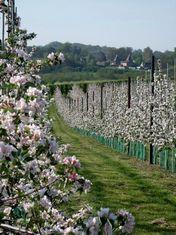
The top-fruit blossoming period in Kent has benefited from excellent weather conditions and, with two weeks to go, has even surpassed last season.
But the well-publicised reduction in honeybee population at this critical pollination time is a long-term underlying worry, according to James Simpson, managing director of Adrian Scripps Ltd.
One of the industry’s most highly regarded growers, renowned for its innovation, Scripps’s orchards are spread over five farms in Kent, covering 350 hectares and with an average yield of more than 13,500 tonnes.
But as the trees start to flower, with pears having peaked into full bloom in mid-April and now being followed by apples, Scripps has come up with a secret weapon that it believes is being used for the first time in the apple and pear industry.
Simpson told FPJ: “We are still fortunate that Kent and Sussex apiarists, from whom we traditionally hire our hives, have a good bee population, but as added insurance we are conducting trials this year by using bumblebees, which we think can do the job equally well.
“An additional advantage is that they still work hard over the month or so when maximum pollination is vital and remain busy at lower temperatures than honeybees, with each hive of about 300 bumble bees pollinating 260,000 flowers a day. However, the hives cannot be moved around as the orchards come into flower.”
Bumblebees only live for a few weeks, but are well known to work for other areas of horticulture such as soft fruit grown under tunnels and in glasshouses.
This spring, 15 trial hives have been supplied to Scripps by Dutch specialist Koppert at a cost of £82 each, which is more expensive than hiring the English honeybee equivalent, where the going rate is around half the cost. Scripps normally hires some 200 hives each year.
The company is also planting areas of bee-friendly plants such as buddleia, pussy willow and downy birch, as well as rich pollen mixes.
Simpson believes the system will pay dividends. “Pollination occurs naturally for many reasons,” he said. “It is just that bees do a particularly vital job, so the widely accepted reports that our population has critically dropped by 30 per cent means it is vital to look for alternatives, and we think that bumblebees will fit the bill.
“What we do know is that good pollination is one of the bedrocks of growing good-quality fruit for the customer, which extends far beyond simply picking and grading.”



